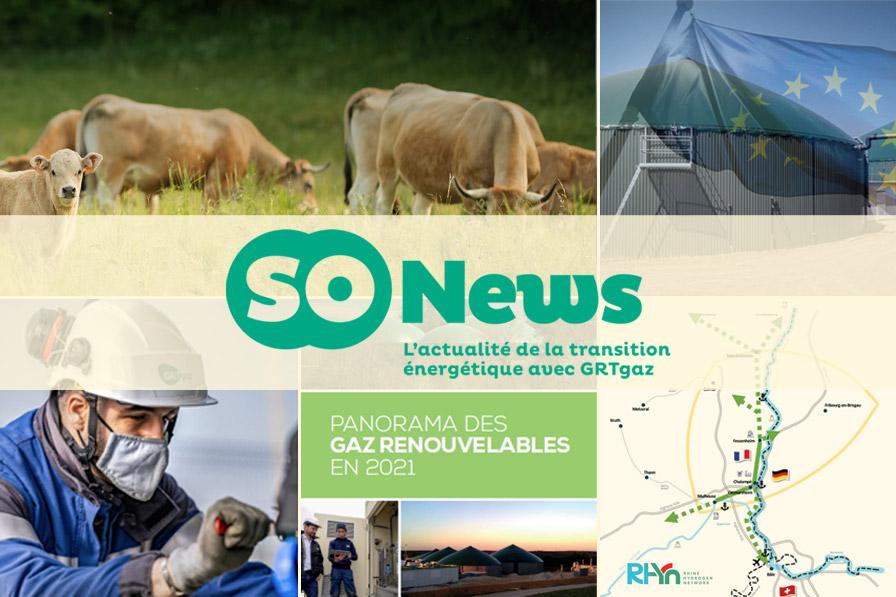Discover the third edition of soNews

GRTgaz’s newsletter aimed at all stakeholders. In summary: Renewable Gas Panorama 2021, REpowerEU plan, RHYn, load shedding decree, GRTgaz Stakeholders’ Manual on the future French Climate and Energy Strategy, residual waste and recovery partnership, GRTgaz 2022 communication campaign.

soNews #3 in summary (June 2022)
The French Renewable Energies Union and the gas network operators, including GRTgaz, have published the annual Renewable Gas Panorama. This seventh edition highlights the capacities of a promising energy sector with the potential to represent 20% of gas consumption by 2030, i.e. the equivalent of Russian gas supplies.
As part of REPowerEU plan, the European Commission has decided to double its target biomethane production from agricultural waste. This figure is now set at 35 m3 per year by 2030. GRTgaz fully supports this historic step forward.
GRTgaz announced the launch of RHYn (Rhine HYdrogen Network), the second French project to convert the natural gas transmission network to hydrogen. This Alsace-based project must meet the hydrogen needs of the Rhin Supérieur region’s ecosystem by 2028, and could subsequently be extended to Bâle.
We talk to Leroux & Lotz Technologies and VINCI Environnement, France’s two leading industrial companies that have entered an industrial development phase for hydrothermal gasification, a technology that processes wet waste and recovers it as renewable gas.
As a consequence of the war in Ukraine, GRTgaz is studying the procedure for implementing a decree published on 7 April setting out the conditions for any potential lowering of French gas consumption. This decree secures the gas supply for sensitive sites and residential heating, while making every effort to control the impact of any load shedding for large consumers.
In response to the consultation launched at the end of 2021 to expand work done on the future French Energy and Climate Strategy, GRTgaz has published its own “Stakeholders’ Manual”. Here, the company offers its vision and recommendations to make renewable gases, low-carbon gases and hydrogen the drivers of the country's energy transition.
GRTgaz, Citéo, Eco-mobilier and Syctom have decided to centre their efforts on the common goal of speeding up the industrialisation of projects to transform residual waste into renewable and low-carbon gas. The four partners want to see the emergence of new, promising waste recovery channels.
France’s gas independence has become a major concern in light of the ongoing geopolitical tensions. Renewable gas and low-carbon hydrogen make up part of the solution. These can cover 20% of our gas supply in 2030 – a volume equivalent to the entire Russian gas supply. This is the message behind GRTgaz’s new communication campaign promoting French gas independence.